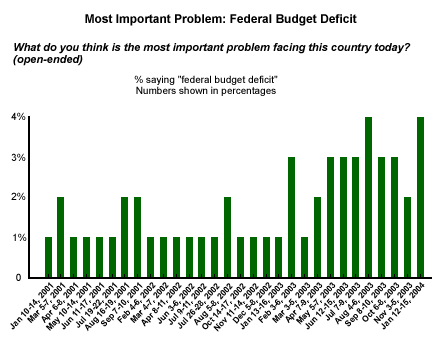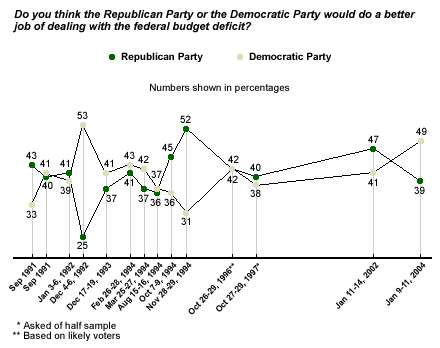The newly released federal budget reveals that the current administration projects a structural deficit of more than $1.3 trillion over the next five years. In Ron Suskind’s recent book, based on the recollections of former Treasury Secretary Paul O’Neill, Vice President Dick Cheney was alleged to have said, "Reagan proved deficits don't matter." But some economists argue that deficits do matter if they are long-term and structural.
A recent missive from the International Monetary Fund seems to reproach America for erasing "a decade's worth of fiscal consolidation," even as the baby boomers get ready to retire. Meanwhile, while the Fed waits patiently for a difficult economy to recover, the dollar has depreciated significantly as the rest of the world has become less willing to finance the United States’ excesses in a low-interest rate environment.
Most Important Problem
Each month, Gallup asks Americans (in an open-ended format) what they believe is the most important problem facing the country today. When it comes to economic problems, Americans are currently most likely to mention the economy in general (16%) or unemployment (13%) as the most important issues facing the country, according to a Jan. 12-15 survey*. Four percent of Americans cite the federal budget deficit as the country’s most important problem.

Most Important Economic Problem
A Jan. 29-Feb. 1 CNN/USA Today/Gallup poll** asked Americans which of several economic issues was the most important facing the country. The list included inflation, unemployment, interest rates, the federal budget deficit, federal taxes, and the U.S. trade deficit. Forty-seven percent named unemployment as the top economic problem, while 22% of Americans elected the federal budget deficit and 7% chose the trade deficit. These data tell us that more Americans are worried about the deficit than about rising inflation rates, interest rates, or taxes, but unemployment still is the top specific economic concern of Americans.
Bottom Line
The budget deficit could be a significant election issue this November, as the Democratic Party seeks political gain by pointing out the increasing deficit under the Bush administration. Such a strategy could work, as currently Americans are more likely to think, by a 49% to 39% margin, that the Democratic Party would do a better job handling the deficit than the Republican Party would. While the question is asked infrequently, it is still the first time in a decade that the public has had more confidence in the Democratic Party than the Republican Party on this issue.

In this era of expensive foreign wars, trillion-dollar tax cuts, and increased entitlement programs, the Republican Party may have a harder time convincing people it is not the party of big government.
*Results are based on telephone interviews with 1,004 national adults, aged 18 and older, conducted Jan. 12-15, 2004. For results based on the total sample of national adults, one can say with 95% confidence that the margin of sampling error is ±3 percentage points.
**Results are based on telephone interviews with 1,001 national adults, aged 18 and older, conducted Jan. 29-Feb. 1, 2004. For results based on the total sample of national adults, one can say with 95% confidence that the margin of sampling error is ±3 percentage points.
